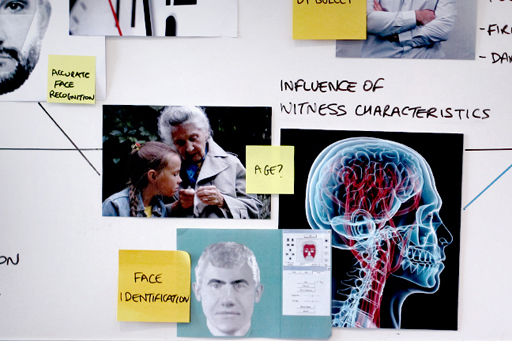1.1 The influence of witness characteristics

It is also important to consider estimator variables to do with who the witnesses were, as well as variables to do with the conditions in which the crime was witnessed. In particular, personality, sex and age have been explored in relation to witness characteristics.
Kapardis (1997) reviewed the evidence regarding the influence of a range of personality characteristics. Much of this evidence tended to consider performance on face identification tasks and the findings are rather tentative. In many cases, the personality characteristic is thought to influence arousal (a psychological and physiological state, in which various parts of the brain show increased activation leading to the person being alert and ready to respond to stimuli) and, as you shall see, it is not always clear how this impacts on witness testimony. For example, neuroticism (a concept from personality theory, characterised by such traits as anxiety and emotional instability) may interact with arousal level to influence memory. The identification accuracy of those low in neuroticism has been found to increase as arousal increases from low to moderate, but the reverse was observed for those high in neuroticism.
Might experience matter? Would a police officer provide more complete and accurate testimony, should they witness a crime? The weight of the evidence suggests that their testimony is no more reliable than that of members of the public. However, a trained police officer may find witnessing a crime less stressful than other people.
Sex
With regards to sex, some studies have shown that female participants provide more reliable ‘testimony’ than males, whereas others have found the reverse, or no difference. Such inconsistent findings suggest that differences between males and females vary or disappear depending on the factors surrounding the event that the witnesses are observing and reporting. For example, males have been found to be better than females at remembering details of a violent incident in several different studies, but no difference has been observed between males and females when shown a non-violent incident (e.g. Clifford and Scott, 1978). Then again, differences can emerge according to the type of details being reported. Some studies have found that females are more often able to remember or reconstruct the precise date of an event, but exhibit the tendency to overestimate the temporal duration of an event more than males. Therefore, while the sex of the witness may impact upon the evidence provided, its influence is by no means clear-cut and it is not a particularly useful variable to consider when evaluating eyewitness evidence.
Age
It is known that our vision and hearing may deteriorate notably from around 70 years of age, and there may also be a decline in attention with ageing. All of these (especially quality of vision) will impact upon the completeness and accuracy of eyewitness accounts. However, the majority of research on the role of age in reliable witnessing has concentrated on children. Generally, young children have been found to provide less information than adults, and are less accurate than adults with details of time, temporal order, estimates of distance and speed, and estimates of height and weight. These findings are consistent with research that suggests an improvement in a variety of cognitive skills with age. However, children as young as six years may perform at adult level in their reporting of an event, and this is dependent on a range of factors, including what they are questioned about and how they are questioned. In other words, and assuming appropriate questioning techniques are employed, younger children may on average remember less accurately than adults, but some individual children will remember as accurately. However, the majority of research on the role of age in reliable witnessing has concentrated on children (e.g. Ceci and Bruck, 1993).
